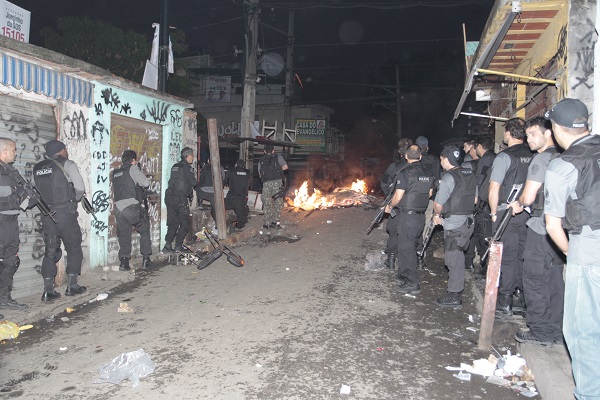2021 was a year marked by vaccination of the population and the relaxation of social restriction measures. The year was marked by violent criminal operations and militia wars. There was also an upswing in illegal border activity with Paraguay. The year was also marked by the explosion of cybercrimes and virtual frauds which were addressed in the Security Review of the month of September. As expected, police operations are starting their way back to pre-pandemic levels, with heated debates about police lethality rates and authorities making promises to address the issue. In Rio de Janeiro, the ADPF (Arguição de Descumprimento de Preceito Fundamental) 635, known as “ADPF das Favelas” which restricted police incursions into the state’s favelas, remains in force.
2021 KEY EVENTS
The so-called “chacinas” in Rio de Janeiro state. The first half of the year was marked by a civil police operation in Jacarezinho, on May 6th , in the capital’s North Zone, which had a high number of victims: 27, including one policeman. The media nicknamed the episode as the “Jacarezinho massacre” and many institutions, such as the United Nations, showed deep concerns with the episode. Other sectors of the society praised it as a “cleansing” operation. In November, 8 people were found dead, with shot wounds, in Complexo do Salgueiro, in São Gonçalo, in Rio’s Metropolitan Region, one day after the Special Operations Battalion (BOPE) conducted an operation in the area, in which an intense shootout happened. Once again, international institutes demanded for an explanation.
Ecko’s death and the war for the militia leadership. In July, Wellington da Silva Braga, aka “Ecko”, head of Rio’s largest militia, was shot dead by the Civil Police in Três Pontes favela, in Paciência, in Rio de Janeiro’s North Zone. The fragile relations among his subordinates broke once and for all. In Ecko’s place, came his brother, Antônio Braga, aka “Zinho”. “Tandera”, who had been Ecko’s right-hand man, left the group and took control of regions in Baixada Fluminense. The dispute led to some fights, and the stage for the main battles was Santa Cruz, in the West Zone. Currently, the war still goes on.
The dispute on the Paraguayan border. In April, the man who commanded the international drug trafficking in the Brazilian border with Paraguay for nearly 50 years, Fahd Jamil Georges, surrendered himself to the Brazilian police. The decision was taken because he feared for his life due to the war between Primeiro Comando da Capital (PCC) and Comando Vermelho (CV). After that, the dispute over the location became more intense. PCC is currently in control of the border cities of Ponta-Porã (Brazil) and Pedro Juan Caballero (Paraguay), but at any moment CV may try to take over.
VIOLENT ACTORS THAT SHAPED THE YEAR’S OUTCOME
Militias: As mentioned before, militias in Rio de Janeiro, are now basically divided into two main branches, Ecko’s and Tandera’s militias, which are at war. Some regions were still controlled by a third leader, allied to Tandera, called “Macaquinho”. Following Macaquinho’s arrest in August, his right-hand-man, “Leléo”, assumed the leadership and allied with Tandera.
Drug traffickers: These groups underwent some changes. For instance, they started to adopt common militia practices, such as charging security fees. The two main groups operating in Rio de Janeiro, CV and Terceiro Comando Puro (TCP), are at war. In the North Zone, TCP has formed a wide area of influence called “Complexo de Israel”, and intends to establish another realm, the so-called “Complexo de Jerusalém”. In order to face CV, TCP has formed alliances with militias.
Public patrimony thieves: The theft of public patrimony has exploded since the beginning of the pandemic, mainly in Rio de Janeiro. Here, theft of copper wires from public lighting, transit, and power transmission heavily affects continuity of public services. For example, Intercity trains are interrupted almost daily because of thefts of energy cables.
Primeiro Comando da Capital (PCC): The country’s main criminal group, from São Paulo, and with strong presence within international drug trafficking in South America, remains firm and strong. It seems to be consolidating its presence in South America and controlling more stages of the drug cycle. Its main exit point from the country continues to be the Port of Santos.
PIX kidnappers: The advent of PIX money transfer technology was a boom for criminals looking to expand their activities. The tool allows immediate transfers of large sums of money at any time, all that is needed is a banking application on a cell phone. Kidnappings with extortion have become common ground in the country, especially in São Paulo, where the crime is expanding and is associated with other sophisticated social engineering techniques.
Authorities have been taking measures to face the main actors mentioned above, some attitudes may already have results next year, but others seem to have effects only later on. It is likely that the militia war in Rio de Janeiro will heat up further, followed by a cooling down. The PIX, on the other hand, may see an improvement in its security mechanisms, reducing the crime rate. Crimes against public property in Rio de Janeiro may start to decrease, but effective results will take a little longer because of the need for better structure. The other actors mentioned above should maintain the status quo.



